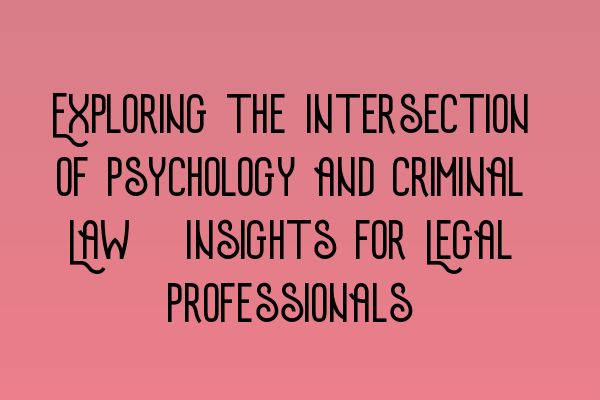Exploring the Intersection of Psychology and Criminal Law: Insights for Legal Professionals
Psychology and criminal law are two fields that may seem distinct at first glance, but upon closer examination, they reveal a fascinating intersection that can greatly benefit legal professionals. Understanding the psychological factors involved in criminal cases can provide valuable insights and enhance the effectiveness of legal strategies. In this blog post, we will delve into this fascinating relationship between psychology and criminal law, shedding light on its importance and offering key insights for legal professionals.
The Role of Psychology in Criminal Law
When it comes to criminal law, it is crucial to consider the psychological aspects that can influence human behavior and judgment. The study of psychology provides valuable insights into why individuals commit certain offenses and how their mental state can impact their actions. By understanding these underlying psychological factors, legal professionals can build stronger cases and develop more effective defense strategies.
One important area where psychology intersects with criminal law is in the realm of criminal profiling. Criminal profilers, often working closely with law enforcement agencies, use various psychological techniques to create profiles of unknown offenders. These profiles can help investigators narrow down the suspect pool and provide valuable information for solving crimes. To delve deeper into this topic, you can read our article on SQE 1 Practice Exam Questions to enhance your understanding of criminal profiling and its practical applications in criminal law.
The Influence of Psychology on Legal Decision Making
Another intriguing aspect of the intersection between psychology and criminal law is the impact of psychological biases on legal decision making. Research has shown that humans are prone to cognitive biases that can affect their judgment and decision-making abilities. These biases can have significant implications for legal professionals working within the criminal justice system.
One well-known example of the influence of psychological biases in legal decision making is confirmation bias. This bias refers to the tendency to seek and interpret information in a way that confirms preexisting beliefs or assumptions. In the context of criminal law, confirmation bias can lead to the selective interpretation of evidence or the overreliance on information that supports a particular hypothesis. By being aware of these biases and actively working to mitigate their impact, legal professionals can strive for more objective and fair decision making.
To further explore the topic of psychological biases and their impact on legal decision making, we recommend reading our article on SQE 1 Practice Mocks FLK1 FLK2. This article delves into the various biases that can influence legal professionals and provides strategies for mitigating their effects.
The Importance of Forensic Psychology in Criminal Cases
Forensic psychology is a specialized field that applies psychological principles to legal issues. It plays a crucial role in criminal cases, providing insights into the psychological state of individuals involved and aiding in the determination of their mental competency during the commission of a crime. Forensic psychologists can assess the credibility of witnesses, evaluate the mental fitness of defendants, and provide expert testimony in court.
Understanding the principles of forensic psychology can greatly benefit legal professionals. By working closely with forensic psychologists, attorneys can gain valuable insights into the psychological factors that may have influenced the defendant’s behavior. This information can be instrumental in developing effective defense strategies or supporting prosecution arguments.
If you are interested in deepening your knowledge of forensic psychology and its applications in criminal law, we invite you to explore our comprehensive SQE 2 Preparation Courses. These courses cover a wide range of topics, including forensic psychology, and provide valuable insights for legal professionals preparing for the SQE 2 exam.
The Future of Psychology in Criminal Law
As our understanding of psychology continues to evolve, its role in criminal law will become increasingly prominent. The growing recognition of the importance of mental health and its impact on criminal behavior is reshaping the legal landscape. Legal professionals who have a solid understanding of psychological principles will be better equipped to navigate these changes and provide effective representation for their clients.
To stay updated on the latest developments in the intersection of psychology and criminal law, it is essential to keep abreast of industry news and upcoming events. We recommend checking out our article on SRA SQE Exam Dates to stay informed about important dates and deadlines related to the SQE exams. This information will ensure that you are prepared and ready to excel in your legal career.
Conclusion
The intersection of psychology and criminal law offers a wealth of insights and opportunities for legal professionals. By understanding the psychological factors at play, legal professionals can build stronger cases, make more informed decisions, and provide effective representation for their clients. As the field of psychology continues to advance, it is crucial for legal professionals to stay updated and embrace the valuable knowledge offered by this fascinating discipline.
